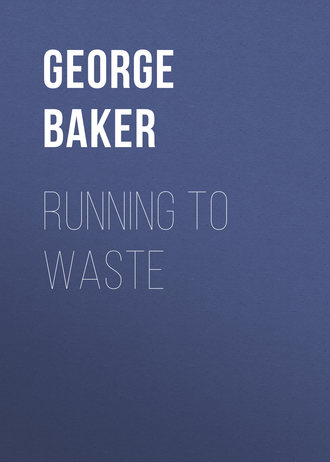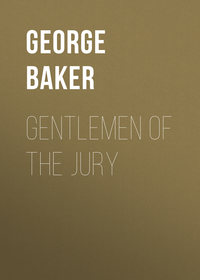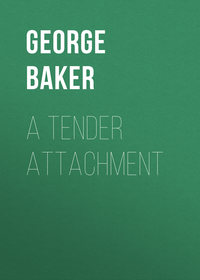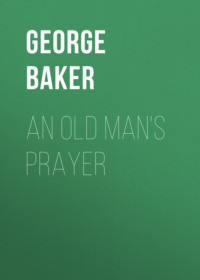 полная версия
полная версияRunning To Waste
Then the good, strong fellows pulled with a will, and in a moment Becky and her preserver were safe on the bank. Such a shout as the good fellows sent up, then such a chorus of shouts as the people at the mill joined to theirs, was never before heard in Cleverly.
But the chorus of rejoicing was unheard by Becky, who lay upon the bank insensible. The girls from the mill gathered about her, rubbed her hands, bathed her temples, and used all the customary means of restoration; but yet she lay there cold and still.
Harry became alarmed. She must be taken home at once.
“Small, bring your wagon – quick! Send a man for the doctor – quick!”
Small’s team was standing at the mill door. In a few moments Harry was in the wagon, with Becky in his arms, and one of the “good fellows” was racing down the road, horseback, for the doctor.
Mrs. Sleeper, weak and dispirited, was in the kitchen, standing at the table, washing the dinner dishes; Aunt Hulda, nursing an attack of lumbago, was groaning at the fireside. A wagon drove swiftly into the yard, a moment, and Harry Thompson stood in the doorway, bearing the insensible form of Becky.
“Mrs. Sleeper, quick! your camphor bottle!”
Mrs. Sleeper dropped the dish in her hands; her eyes glared at the helpless girl. Her lips parted, but no sound came from them. Then her eyes closed, her hands clutched the air, and she fell heavily to the floor. Aunt Hulda ran to her and raised her head.
“Delia Sleeper, what on airth ails you? – Here, you, Henry Thompson, take that girl into the settin’ room. That’s just like you Thompsons – always a scarin’ folks to death. – Delia, Delia! what ails you?”
Aunt Hulda rubbed her, and sprinkled water over her, scolding all the while. Harry carried Becky to the sitting-room, and laid her upon the lounge. As he did so, a sigh, and the opening of her eyes, gave assurance of returning animation; and when, in a few minutes, Dr. Allen entered, there was no occasion for his services, for Becky was sitting up, and inquiring for Teddy, who at that moment was coming down the road, between the mill and the school-house, feeling very wet and mean.
Mrs. Sleeper was carried to her room, and laid upon the bed. Dr. Allen, finding Becky so comfortable, made the former a visit.
“Doctor, what ails her? Is it stericks?”
The doctor shook his head.
“Worse than that, worse than that!”
“You don’t say so! Goodness gracious! it’s purrellysis.”
The doctor nodded. Aunt Hulda was right. The sudden shock, upon the long and weary straining for the ever-distant ship, had snapped the cords of action, and left her powerless.
CHAPTER VII.
MRS. THOMPSON DISOBEYS ORDERS
“When that grim smith, Adversity, stalks unannounced and unwelcome into the abode, erects his forge, bares his strong arm, and sets himself to work among our affections, feeding his fire with earthly treasures, perhaps too fondly prized; or poisoning the air with unhealthy vapors, that blight with disease; or shaping upon his anvil the arrows of death, for instant use among the loved ones, – it is a hard task to meet him hospitably; to be patient under the agony of his blows; to realize, in his presence, that in his forge is the soul whitened and made pliable, that under the heavy hammer he relentlessly wields it is shaped to nearness of perfection.
“But when time has cooled the beaten soul, then it realizes how much stronger it has grown through that dread experience; how much better fitted it is to meet the ever-returning guest; then it recognizes in this hard-hitting smith, Adversity, an earnest worker for the universal good.”
Thus preached Parson Arnold, the salaried fountain from which the good people of Cleverly drew the living waters for their spiritual needs. His auditors were Captain Thompson and his good wife, to whom the parson had just communicated the misfortunes of the Sleeper family, on the day of their occurrence, he having picked up the intelligence at the blacksmith’s shop, while awaiting the setting of a tooth into an iron rake, upon which he was now leaning in the sitting-room at Captain Thompson’s. Perhaps the skill of the agricultural dentist had suggested the illustration with which he seasoned his short discourse upon the uses of adversity, for he was an earnest worker both in his Master’s vineyard and his own, and used both logical and local arguments to drive home to the hearts of his people the great truth which he honestly believed.
“Poor soul! struck down in an instant! what will become of the children?” said Mrs. Thompson.
“The town will have to take care of ’em. After this caper I’ve done with ’em. I wash my hands of all responsibility,” growled the captain. “That young tomboy of theirn has kicked about until she’s broke her mother’s heart; and I hope she’ll have to suffer for it.”
“Nay, nay, brother; we must be charitable. Remember her youth and inexperience,” the parson mildly remonstrated.
“Well, I ain’t likely to forget it. It’s been a dear experience to me; and I won’t have anything more to do with them.”
“Don’t say that, Paul,” said Mrs. Thompson, rising from her chair. “They need kindness more than ever. Their poor mother can no longer guide them: shall we desert them now?”
“Guide them! Stuff! She never did guide them. If she had, she’d have been saved all this trouble.”
“Well, well, they’re in the Lord’s hands,” said the parson; “in his hands who suffers not a sparrow to fall to the ground without his notice. Leave all to him.”
The parson put on his hat, shouldered his rake, and departed. Mrs. Thompson attended him to the door, returned, folded up her work, and left the room. The captain followed her motions with his eyes. Something was wrong. There was no heart in his obstinacy. He evidently felt ill at ease. He walked about the room rapidly, as though endeavoring to rouse up something like an angry spirit; but the fire would not kindle. Instead of the angry flash which should have shone in his eye, there was a tear, and the muscles of his mouth quivered with suppressed emotion. Mrs. Thompson entered the room, equipped in bonnet and shawl.
“What! going out again, Rebecca?”
“Yes, Paul; I am going at once.” Mrs. Thompson looked almost defiantly at her husband, expecting the next question, and fully prepared to answer it. But the second question was indefinitely postponed. It trembled on the captain’s lips, but something in his wife’s face told him if he asked it his power to rule was gone forever.
“Well, don’t be gone long; it’s lonesome here without you.”
Mrs. Thompson seemed in turn disappointed, but she said nothing, and departed. The captain took a seat upon the sofa, whence he had a view of the road, and deliberately watched his wife.
“Hum! told you so,” soliloquized he; “there she goes – straight down the hill! There never was such a woman! Deliberately disobeying her husband. Bless her good heart! I knew she’d go. Never could stand that – never! It’s wrong. Obedience is a wife’s first duty. Won’t she make things fly over there! Poor Delia! She shan’t want for physic as long as I live; and those young ones – well, well, boys will be boys, and girls will be – tomboys, sometimes, I suppose. There she goes, up the hill, now. Disobedience, – rank disobedience! I can’t endure the sight of it, and I won’t! I’ll just saddle Uncle Ned, and go and see the doctor. She must have constant attendance; and my wife, – no, I won’t forgive her disobedience – never!”
The captain now went to the window, and watched until his wife turned into the gate; then, heaving a sigh (more closely resembling satisfaction than regret), went in pursuit of Phil and Uncle Ned.
Lightning, that swift agent of destruction, has been known, in the midst of its vagaries, to smite gigantic rocks, and lay open veins of wealth never before discovered. When the bolt of misfortune struck the Sleeper house, it brought to light a much-needed treasure in the person of the forlorn, complaining Aunt Hulda. She seemed electrified by the stroke that paralyzed the languid mother, and all the powers of her being sprang into active life. All the theoretical knowledge she had acquired by her long, useless “helping” of other people, burst into fruitful bloom. From the moment Mrs. Sleeper was laid upon her bed, she was the careful, watchful nurse, quietly but hurriedly arranging everything for the comfort of the invalid, laying her plans for a long fit of sickness with all the skill of an old campaigner. Nor did her usefulness end here. From the chamber to the kitchen she flew, washed and put away the dishes, replenished the fire, swept and tidied up the kitchen, re-filled the kettle, made up a batch of bread and set it “rising,” and back again to the bed-side of her patient, without one thought of her own magazine of combustible troubles ready to explode at a spark of complaint. All this with a feverish uneasiness, as though she feared the coming of somebody to take the power to do out of her hands. A gentle knock at the door of the sick chamber, and the entrance of Mrs. Thompson, told her the somebody she feared had come.
Mrs. Thompson gave her hand to Aunt Hulda with a quiet smile, and went to the bed. What there was left of life in the body of Delia Sleeper seemed concentrated in her face. She could not move foot or hand; but the same watchful glance was in her eyes, and the shadow of a smile played about her mouth, as her old friend bent over her and kissed her.
“So kind! so good! I knew you’d come.”
Faint and tremulous was the voice of the invalid.
“Yes, dear heart; I’ve come to nurse you, to make you strong and well again.”
Aunt Hulda groaned. Her power was slipping from her.
“No, no. Aunt Hulda – so kind – she does everything. She will nurse me – thank you. Let me – see you often – that’s all.”
The eyes wandered to Aunt Hulda with a beseeching look that Mrs. Thompson divined at once.
“Bless you child! I’ll not interfere with her. She shall be mistress in the house; and a good one she’ll make.”
This was said with a smile for Aunt Hulda that warmed the heart of the spinster towards the visitor. There was a pleased look in the eyes of the invalid, as those of Mrs. Thompson came back to her full of love and sympathy.
“Thank you. Come closer. Becky – my Becky – don’t let her believe she did this. I’ve brought it on myself – the doctor said so. Too much watching – you know – it’s been wearing upon me. The ship – that never comes – never, never comes. But it will – I know it will.”
“I wouldn’t speak of that, Delia, now. The ship will come in God’s good time,” said Mrs. Thompson. “Remember the dear ones here, and trust the absent one to his care.”
“Yes, yes; but I didn’t,” said the sick one, sighing. “I forgot my treasures here, hoping to clasp that other every day; and now I’m punished. Wasted life! Wasted life! Poor little girl! with her mother’s heart shut against her, drifting away – running to waste; and so smart and apt to learn! God pity me! God pity me!”
“Leave all to me, Delia. Let no thought of Becky disturb you.”
“I cannot help it. It seems to me as though I had wilfully neglected her.”
“Not as I have, Delia. With all your household cares, my little namesake claimed some portion of my attention; and we have not met for years. Delia, you know the reason. I blame myself for this long neglect.”
“No, no; you were always a kind, good friend. But I suppose he thought it best. Becky is in the sitting-room; won’t you see her and comfort her?”
“Now and always. With Aunt Hulda’s permission, she shall be my especial charge hereafter.”
“O, you are so good! No wonder people love you.”
Mrs. Thompson kissed her friend, and passed out of the room. Aunt Hulda smoothed the bedclothes, and looked at her patient inquiringly.
“Yes, go, go,” said Mrs. Sleeper. “But first kiss me, Aunt Hulda – won’t you my best friend?”
Aunt Hulda made a dash at her lips, and a loud smack resounded through the room.
“You dear, dear, dear child! May the Lord give me strength to do for you as you deserve!”
With her apron to her eyes, Aunt Hulda left the room, leaving the invalid to her solitary vigil. Already was adversity working in her for good. The mother-love so long repressed in her heart had, by one of those strange phases of illness, at once asserted itself the ruling power. Only a few hours had the active forces refused to obey the will; only a few hours had the brain caught this new power from the heart; yet it had travelled over years and years of neglect and wasted opportunity, with bitter regrets that might yet shape themselves into guiding forces, in the lonely vigils of the years to come.
Becky Sleeper, under the shadow of this sudden visitation, had in turn received a shock. The terrible sequel to her frolic had, upon her revival, produced such a nervous state, that for two hours she lay upon the sofa, trembling and weeping, in the presence of the astonished Teddy, who never before had seen a tear in the eyes of his volatile sister. Harry Thompson had, when he found her in no danger, consulted his own safety by driving to the house of Mr. Drinkwater for a change of raiment. Aunt Hulda’s attention was required at the bed-side of her patient, and Miss Becky was left to recover at her leisure. The period of lamentation having passed away, she lapsed into a state of dejection, so long and silent that Teddy, weary with waiting for her to break the silence, quietly fell asleep.
Becky’s thoughts ran over and over the recent events; but in the midst of them all this was uppermost: “I’ve killed mother.” Again she swept across the Basin; again clutched at drifting Teddy; again fell splashing in the water; again glided down the stream, heard the roar of the dam, the voice of Harry; but all mixed with this one thought, “I’ve killed mother.” And she buried her head in the sofa, shut her eyes hard, and thrust her fingers into her ears, in vain attempts to shut out the thought. What would become of her? Would she be locked up in jail – hanged? She must be, for it was murder!
Becky was not well skilled in reasoning. She could not have told why this feeling took possession of her; but there was a dim consciousness that she must be an awful wicked girl, and that it was somebody’s duty to punish her for this, and a wild wish that somebody would be quick about it, and have it all over with. In this state she was conscious of the opening of the door, and the presence of some one in the room. There was a light step by her side; a soft hand was placed upon her head.
“Becky, my child, you are making yourself miserable.”
Becky knew that well enough. Why should she be told what she knew so well? It was nobody’s business, any way. Why didn’t people attend to their own affairs? She failed to recognize the voice, and, being in an ugly state of misery, snatched the soft hand from its resting-place, and flung it rudely from her, with her eyes defiantly closed.
Mrs. Thompson did not replace the hand, did not repeat the words. She stood looking at the girl a moment, then passed across the room, and took a seat by the window. This movement set Becky to thinking. Who could it be? It was a kind voice, a warm, soft hand. There was no feeling of punishment in either. Why didn’t the visitor speak again? How rude she had been! Then there came a long pause. She was listening intently for some signs of her visitor’s presence. Hush! No; that was Teddy, snoring. She recognized that; and then – yes, some one was breathing by the window. Who could it be? Some one quietly waiting for her to get over her ugly fit. She felt a pair of eyes were fastened upon her. Wondered if her hair was fit to be seen, if there were any rents in her dress, and – and – O, dear, this was terrible! She would know the worst.
Suddenly she sprang up, and looking across the room, met the loving eyes of Mrs. Thompson; saw a smile wreathing about the lips; saw the arms of the good woman stretched out to her so invitingly, that, without further invitation, she ran into them, and nestled her head among the plaits of Mrs. Thompson’s merino, as if she had an undoubted right there. Then of course, she fell to crying again.
“O, Aunt Rebecca! you’re so good! and I’m so wicked!”
“No, no, pet. I’m a wicked woman for neglecting you so long. But it’s all right now. I have you in my arms, just as I had you when you were a baby; and I don’t mean to let you go. Now tell me what’s the matter.”
“Why, don’t you know? I’ve killed my mother!”
“No, no, pet. Dismiss that fear from your mind. She is very ill; perhaps may never recover; but the doctor says her disease has been a long time coming on.”
“And that I tumbled into the water, got most drowned, and frightened the life out of her,” burst out Becky. “O dear, dear! what will become of me?” And another deluge of tears swept over the placid bosom of Mrs. Thompson.
“Hush, hush, dear child! You were not to blame. Any sudden shock might have caused the disaster.”
“Aunt Rebecca, do you mean to say I am not a bad, wicked girl?”
Becky straightened up with such an air of injured guilt that Mrs. Thompson looked at her in surprise.
“Becky, how old are you?”
“Sixteen, Aunt Rebecca.”
“Quite a young lady, I declare. Now that mother is laid upon a sick bed, the care of the house devolves upon you. Girls of sixteen are usually fitted for that position. Do you feel prepared to attend to those duties?”
Becky hung her head.
“No, Becky, you are not a wicked girl. But it is time for some good friend to show you how you have wasted the powers God has given you. Had you given the same attention to learning to keep house that you have to playing ball and tag, to robbing orchards and shooting the Basin, you would have been ready to take your place at your mother’s bed-side, or to take charge of cooking. You would have gained the good opinion of everybody, instead of being shunned as a tomboy; and you would not then have reproached yourself, as you do now, for being the cause of your mother’s illness.”
“I know it, I know; ’tis all my fault, ’tis all my fault!” sobbed Becky.
“Not altogether your fault, pet. You have had no one to lead you aright. But ’tis time you learned a young woman’s duties. You are quick, intelligent, apt to learn. Will you let me give you a few lessons, Becky?”
“O, Aunt Rebecca, if you don’t hate me, if you will try and make something of me, I’ll never go out doors again as long as I live!”
Mrs. Thompson smiled.
“Plants will not thrive without air, Becky: you shall have plenty of it. Now, dry your eyes, and come with me to see mother.”
“Not now, Aunt Rebecca; I’m not fit. I hope you’ll make something of me; but it’s an awful bad job. One thing I mean to do. I’ll try just as hard as ever I can to do just what you tell me.”
“That’s right, Miss Becky Sleeper; and if you do what that angel woman tells you, you are on the straight road to heaven, I can tell you.”
Mr. Harry Thompson came running into the room.
“Don’t scold, mother. I’ve been listening outside the door for the last five minutes. Let me congratulate you on your promising pupil.”
“I think I can make something of her,” said Mrs. Thompson looking with pride at her handsome son.
“Not without my help, mother. I know all the good points of that sportive genius, for, alas! I helped to train them in the wrong way. So, to make amends, employ me in the good work of training this wandering vine in the proper direction. What do you say, Miss Becky?”
“I don’t know what you mean, Harry,” said Becky, soberly. “Is it some new game you want to teach me? If it is, I can’t learn it, for I’ve promised not to play any more.”
Harry laughed.
“Yes, Becky, ’tis a new game. We’ll call it ‘Excelsior,’ a game which requires work, and not play.”
“Don’t puzzle the child, Harry,” said Mrs. Thompson.
“Child!” echoed Harry. “Sweet sixteen; and yet she’s but a child.”
“You saved my life, Harry,” said Becky, with tears in her eyes. “I don’t know as I ought to thank you for doing it, for Aunt Rebecca says it’s been a wasted life. But I do thank you all the same.”
“Perhaps I’ve brought you into a new life, Becky. I hope I have – the life of usefulness we all should live.”
“Look out, Becky! she’s drifting!” shouted Teddy, in his sleep. “She’s drifting! she drifting!”
He moved uneasily in his sleep, started, rolled off his chair, and drifted on to the floor, with a crash that shook the house.
“Teddy Sleeper, what ails you? Wake up!” cried Becky, running to him, and shaking him. “Don’t you see we’ve got company?”
Teddy rolled over, sat up, and stared wildly about him.
“I don’t care, Becky Sleeper. I ain’t a goin’ to be stumped by a girl, any way.”
Harry Thompson laughed so loud that Teddy sprang to his feet in confusion.
“Stick to that, Teddy, and we’ll make a man of you.”
CHAPTER VIII.
BECKY’S NEW BIRTH
Into the life thus accidentally opened to her, Becky dashed with the same vigor and determination which had characterized her dealings with the sports of tomboyhood.
On the departure of the Thompsons, she marched into the kitchen, and surprised Aunt Hulda by pulling the table into the middle of the floor, spreading the cloth, and arranging the dishes for supper.
“Goodness gracious, child! What’s come to you?” cried the spinster, in astonishment.
“Don’t say a word, Aunt Hulda. I’ve been a bad girl, but I mean to do better. I’m not going to let you do all the work in this house.”
Aunt Hulda looked at the girl uneasily. Was this madcap endeavoring to take the reins out of her hands?
“Indeed! Praps you’d like to be mistress, and order me round.”
“No, indeed, Aunt Hulda; you shall be mistress, and I’ll be maid. It’s little I know, shame on me! but I want to learn; and you know how to teach so well that I shan’t bother you long with my clumsiness, I guess.”
“Well, that’s clever. You’re real handy, too; only you’ve put the knives and forks on the wrong side of the plates.”
“So I have,” said Becky, quickly “changing sides.” “Where are you going now, Aunt Hulda?”
“After wood; the fire’s getting low. It’s got to be chopped, too. But I can manage that.”
“No, you must not. – Here, Teddy, bring in a good big armful of wood; and don’t you never let Aunt Hulda bring another stick.”
Teddy had been standing by the window, gazing, in open-mouthed astonishment, at Becky’s proceedings. He roused himself at her sharp call, and obeyed.
“Guess Becky’s a little out of head,” he soliloquized, in the woodshed. “Got too much water on the brain in the dam.”
Supper finished, Becky washed the dishes, cleared away, and swept the kitchen, under the direction of Aunt Hulda, and then insisted on making bread, after careful directions from the mistress. All this was faithfully reported to Mrs. Sleeper by Aunt Hulda.
“I tell you, Delia, there’s the making of a smart woman in that girl; and it’s coming out fast.”
When bed time came, Becky went in to her mother with a sad face. The idea that she had caused her mother’s illness was so strong upon her, that it could not be easily dissipated. Perhaps it was better so, if it only strengthened her in her determination to achieve success in the new life.
“How do you feel to-night, mother?” said Becky choking down a sob, and laying her hand on her mother’s head, with a caress.
“Happy, Becky, very happy,” said the mother, with a smile. “The light step of a little woman about the house has made me wonderfully contented.”
The “little woman” blushed, then said, with a smile she found it hard to muster, —
“Sick people should not listen. But I’m glad it made you happy, mother. Shall I stay with you to-night?”
“No; Aunt Hulda will take care of me. Good night.”
“Good night, mother” with a kiss. “Don’t worry about me. I mean to try, O, so hard – ”
She could say no more. The tears would come, spite of her efforts to repress them; and she ran from the room.
She slept little that night; the new tenant – thought – rambled strangely about in its unfamiliar quarters, as if uncertain at what task to set itself, in what corner of this little head to find a resting-place.
Mr. Drinkwater was no better the next morning, and Harry Thompson opened the school, as usual. He was gratified, on casting his eyes about the room, to see Becky and Teddy in the places assigned them the day before; and very much surprised, when the religious exercises were concluded, to see Becky rise from her place, and march to the centre of the room.









